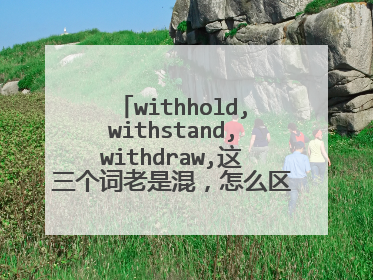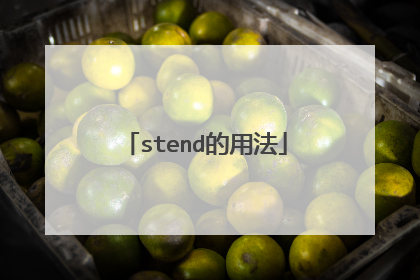withdraw的用法(withdraw的用法和例句)
最后更新:2022-11-26 08:08:10 手机定位技术交流文章
英语各个介词什么用1
⑴ 时间或地点介词in、on、at的用法区别:表示时间时, in表示在一段时间里(在将来时句子中则表示在一段时间之后), on表示在具体的某一天或者某天的上下午等, at表示在某个时刻或者瞬间;表示地点时, in表示在某个范围之内, on表示在某个平面上或与一个面相接触,at则表示在某个具体的场所或地点。如:He was born on the morning of May 10th.(他出生于五月十日的早晨)/ I usually get up at 7:00 in the morning.(我通常在早上的七点钟起床) / His glasses are right on his nose.(他的眼镜就架在他的鼻子上)/ He is at the cinema at the moment.(此刻他正在电影院) ⑵ after与in表示时间的用法区别:“after+(具体时刻/从句)”表示“在…时刻之后”常用于一般时态;“in+(一段时间)”表示“在(多久) 之后”,常用于将来时态。如:He said that he would be here after 6:00.(他说他六点钟之后会来这儿)/ My father is coming back from England in about a month.(我父亲大约一个月以后从英国回来)⑶ since与for表示时间的用法区别:“since+(具体时刻/that-从句)”表示“自从…起一直到现在”,“for +(一段斶间)”表示“总共有…之久”,都常用于完成时态;如:Uncle Li has worked in this factory since 1970.(李叔叔自从1970年起就在这家工厂工作了)/ Uncle Li has worked in this factory for over 30 years. (李叔叔在这家工厂已经工作了30多年)⑷ by、in与with表示方式的用法区别:都可以表示“工具、手段”,但是by主要表示“乘坐”某个交通工具或“以……方式”,在被动句中可以表示动作的执行者;in表示“使用”某种语言/文字,with表示“使用”某个具体的工具、手段。如:We see with our eyes and walk with our feet.(我们用眼睛看东西,用双脚走路)/ Please write that article(文章) in English.(请你用英语写那篇文章)/ Let’s go to the zoo by taxi.(我们打的去动物园吧。)/ It was written by Lao She.(那是老舍写的)⑸ about与on的用法区别:都可以表示“有关…”,但是about的意义比较广,而on主要表示“有关…(专题/课程)”。如:Tom is going to give a talk on the history of America.(汤姆要作一个美国历史的报告)/ They are very excited talking about the coming field trip.(他们兴致勃勃地谈论着即将来到的野外旅游)⑹ through与across、over的用法区别: through指“穿过…(门洞/人群/树林)”; across和over可以指“跨越…(街道/河流)”,可互换,但是表示“翻过…”时只能用over. 如:Just then a rat (鼠)ran across the road.(就在那时一只老鼠跑过路面)/ There is a bridge across/over the river.(河上有座桥)/ They climbed over the mountain and arrived there ahead of time.(他们翻过大山提前到达了那里)/ The visitors went through a big gate into another park.(参观者们穿过一个大门来到另一个公园)(7)as与like的区别:两个词都表示“像……”,但是as译为“作为……”,表示的是职业、职务、作用等事实,而like译为“像……一样”,表示外表,不是事实。如:Let me speak to you as a father.(我以父亲的身份和你讲话。)(说话者是听者的父亲) / Let me speak to you like a father.(让我像一位父亲一样和你讲话)(说话者不是听者的父亲)(8)at the end of、by the end of、to the end、in the end的用法区别:at the end of…既可以表示时间也可以表示地点,译为“在…末;在…尽头”,常与过去时连用;by the end of…只能表示时间,译为“在…前;到…为止”,常用于过去完成时; in the end与at last基本等义,表示“终于、最后”,通常用于过去时;to the end译为“到…的终点为止”,前面往往有表示运动或连续性的动词。如:By the end of last term we had learned 16 units of Book III.(到上学期期末我们已经学习了第三册16个单元)/ At the end of the road you can find a big white house with brown windows.(在路的尽头你能找到一幢有棕色窗户的白房子)/ They left for Beijing at the end of last week.(上周末他们动身去了北京)/ In the end he succeeded in the final exams.(他最终在期末考试中考及格了)/ We should go on with the work to the end.(我们应该把工作干到底)/ Follow this road to the end and you will see a post office.(沿这条路走到底就能看见一家邮电局)(9)for a moment、for the moment、in a moment、at the moment的区别:for a moment“一会儿、片刻”(=for a while),常与持续性动词连用;for the moment“暂时、目前”,常用于现在时;in a moment“一会儿、立即、马上”(=soon; in a few minutes),一般用于将来时;at the moment“此刻,眼下”(=now),用于现在进行时。如:Please wait for a moment.(请稍等)/ Let’s leave things as they are for the moment.(暂时就维持现状吧!) / I’ll come back in a moment.(我过会儿回来)/ I am very busy at the moment.(眼下我很忙)(10)but的问题:用介词but引出另一个动词时,要注意:如果前面有do,后面就用原形动词,前面没有do时,后面的动词要加to。如:I could do nothing but wait.(我什么也做不了只能等) / They had no choice(选择) but to fight.(他们没有选择只有战斗)(11)in front of 与in the front of: in front of“在…的前面”, 与in the front of“在…的前部”。如:A car was parking in front of the hall.(大厅跟前停着一辆汽车)/ In the front of the hall stood a big desk.(大厅前部立着一个大讲台)(12)except (for)与besides的区别:except“除了”,表示排除掉某人物,即不包含;而besides“除了”则表示包含,即“不仅……又……”。如:Everyone went to the Palace Museum except Tom.(除了Tom,大家都去了故宫博物院)(Tom没有去故宫)/ Besides Chinese he also studied many other subjects.(除了汉语之外,他还学其他许多功课)(“汉语”也是他学的功课之一)other than 除了......之外...... There 're nobody here other than me 与.....不同..... 与.....不同方式.....we can't get there other than by swimming. Apart from : with the exception of ...; besides... Apart form a few scratches, the car was undamaged.
在英语中,介词(preposition)虽然是一种小词,但在作用和运用上的复杂性却不可小看。首先,可以毫不夸张地说,离开了介词的中介或连接作用,就无法表达某些最基本的思想或概念。以时间为例,大到年代,小到日月,要表示某些特定的时间或时刻,离开介词有时就会寸步难行。比如"今年"虽然可以说this year,但要表达"在2000年",就不能省略介词,而要说in 2000;"这个月"是this month,但"6月里"则需要说in June;"今天"虽然有现成的today一词,而如果是"在6月5日"就要说"on June 5th","在星期五"就得用on Friday(但在某些新闻报道里这些介词也可以省略不用)。再以位置为例,我们可以随便举出book和desk两个词,然后用介词表达出各种位置关系:the book on the desk(桌子上的书)、the book under the desk(桌子下面的书)、the book near the desk(桌子附近的书)、the book beside the desk(桌子旁边的书)等等。 介词不仅具有重要的表达意义的功能,而且在使用上也十分复杂。造成这种复杂现象的原因是多方面的。首先,单个介词(即由一个词语构成的介词,与此相对的是复合介词,比如upon,into,within,without等)本身的意义具有相当的复杂性,以in和on为例,in的基本意义是"在里面",表示一种范围,on的基本意义是"在上面",表示两种东西相接触,然而在speak in English(用英语说)和on the team(在队里当队员)两种形式中,in和on表达的则是引申意义;the boat on the lake指的是"湖上的船",但the cottage on the lake则表示"湖边的小屋"。其次,英语中的单个介词虽然只有60个左右,但这些介词却可以同其他词类灵活搭配,构成为数众多的短语形式:1.介词加名词构成的短语,由称介词短语,如by accident(偶然地),on purpose(故意地),for example(例如)in conclusion(总之)等。2.由名词加介词构成的短语,比如concern for(对……的关心),love for(对……的热爱),satisfaction with(对……满意),confidence in(对……的信任),loyalty to(对……的忠诚)等等。3.由动词加介词构成的短语,例如insist on(坚持要……),differ from(不同于,区别于),distinguish between(区别,区分),benefit from(从……得到益处,受益于……),conform to(符合)等等。4.由形容词加介词构成的短语,比如be keen on(对……很热衷),be worried about(为……而担心),be fond of(喜欢),be strict with(对……很严格),be loyal to(终于……)等等。上述这些搭配形式大都具有固定性,运用时常常来不得半点差错。比如比如be interested只能和in搭配构成介词短语,according和instead只能分别与to和of搭配构成两种短语介词。此外,英语中还有一类短语介词,也即由介词加其他此类构成的短语,但作用相当于一个介词,比如in front意思接近before,in spite of和despite是一个意思,apart from和意义也很相近等等。短语介词还有很多,再如according to(根据),along with(随同……一起),because of(由于),by means of(依靠),instead of(代替),in accordance with(与……一致,依据),on behalf on(代表),owing to(由于),together with(和……一起),with regard to(关于),as for(至于),as to(至于),in view of(鉴于),for the sake of(为了……),on account of(由于)等等。最后,单个介词还可以用在一起,这种现象称为双重介词,比如from within(从……里边),from behind(从……后边),from inside(从……里边),from outside(从外边)等等。其三,同一个介词和不同的词语搭配或者同一个词语和不同的介词结合都可以产生不同的意义,前者如be good at(善于),be bad at(不善于),后者如agree with sb.(同意某人),agree on sth.(同意某事);在有些情况下,同一个介词和不同的词语搭配或者同一个词语和不同的介词结合有时也能产生相同的意义,前者如depend on(依靠),rely on(依靠),count on(依靠),后者如be good at(善于),be skillful in(善于)。其四,有些结构用不用介词意义完全相同,比如consider后面的as就可以省略而意义不发生变化,而在有些结构中,有无介词意义则不完全相同,比如《红楼梦》中的刘姥姥初进大观园时会说:It is beautiful in here. 而贾府的丫鬟则会应酬说:Yes, it is beautiful here. 刘姥姥的话含有一种对比意义,即大观园和外面相比简直是两个世界,丫鬟已在贾府住习惯了,因此她的话就没有这种对比意义,所以刘姥姥就用了带有比较意义的in here,而贾府的丫鬟则用了没有对比意义的here。除上面提到的几点外,英汉语不同的表达习惯也增加了介词学习的复杂性,比如英语说in the sun, in the moon,汉语则说"在阳光下"(英语的under the sun是"普天之下"的意思)、"在月光下";英语说The sun rises in the east and sets in the west,汉语则说"太阳从东方升起,从西方落下",或者不用介词,干脆说成"太阳东升西落";英语中的the hole in the wall, the nail in the wall, the map on the wall三个短语中用了不同的介词,而汉语则都用一个"上"字来表达:墙上的洞、墙上的钉子、墙上的地图;汉语可以直接说打某人的某个部位,英语则要先说打某个人,然后再通过介词去打某个部位:beat sb. on the head(打某人的头),同样,英语要说抓着某人某个部位,就得先说抓着那个人,然后再用by来表示被抓着的部位grasp sb. by his hand(抓着某人的手);英语中有besides和except两个词语,汉语可以用"除了"一种形式来表达,但汉语的"除外"既可以指包括,又可以指排除,在这两种不同的情况下,英语就得分别用两个介词来表示:We all went there besides John. 除了约翰我们也去了那里。(即约翰去了,我们也去了)We all went there except John. 除了约翰我们都去了那里。(即我们都去了,但约翰没去)最后,为了解释英语介词用法上的复杂性和灵活多样性,我们特以from一词为例来作进一步的说明。1.表示纯粹的分离,作"分开"、"分离"、"隔开"、"离开"解,常构成下列表达形式:separate the good from the evil(把好的和坏的分开)remove from the city to the countryside(从城市移居乡村)part from a friend(断交)depart from one's hometown(背井离乡)keep away from dangerous things(远离危险)flee from prison(逃离监狱)keep (stand. aloof from the society(离群索居)rise from table(离席)fall from a tree(从树上掉下来)withdraw from a meeting(离会)move from one place to another(从一处迁至另一处)retire from one's work(退休)live apart from other people(离群索居)2.表示"消失"、"消除":The plane soon disappeared from sight. 飞机很快消失不见了。After hearing this, the smile fled from her face. 听到这里,她的笑容立即消失了。Let us remove all doubts from our minds. 让我们消除相互间的猜疑吧。3.表示"禁止"、"戒除"、"免除"、"解除"、"除去"、"使免除"、"使脱离"等,有时具有否定意义,常构成下列表达形式:remove dirt from a table(除去桌子上的灰尘)release sb. from his suffering(解除某人的痛苦)clear the land from trees(伐去地上的树木)free sb. from debts(免去某人的债务)dismiss sb. from his service(解除某人的职务)expel (dismiss) a student from school(开除学生)be excused from punishment(被免去处罚)be safe from danger(没有危险)be secure from danger(没有危险)be free from anxiety(无忧无虑)rescue a person from danger(救人于危难)deliver a person from danger(救人于危难)4.表示"防止"、"阻止"、"阻碍"等,有时具有否定意义,常构成下列表达形式:prevent sb. from doing sth.(防止、阻止某人做某事)keep sb. from doing sth.(阻止某人做某事)stop sb. from doing sth.(阻止某人做某事)hinder sb. from doing sth.(妨碍某人做某事)prohibit sb. from doing sth.(禁止、阻止某人做某事)discourage sb. from doing sth.(劝阻某人不去做某事)dissuade s. from doing sth.(劝阻某人不去做某事)5.表示"不在"、"缺席"等:be absent from a class(缺课) absent oneself from class(缺课)be away from home(不在家) stay away from a place(不在某个地方)6.与protect, guard, shelter, defend等动词搭配表示"保护":An umbrella protects us from rains. 伞可以使我们不受雨淋。The big tree sheltered them from the rain. 大树保护他们没有被雨淋湿。7.表示"隐藏"、"隐蔽"、"隐瞒"等,常与hide, conceal等动词搭配:As a student, you should have no secret from you teachers. 作为学生,你不应该有任何隐瞒老师的事。The house was hidden from view by the trees. 那座房屋被树遮着了。He always tries to conceal his poverty from others. 他总是设法不让别人知道自己的贫困。8.与tell, know, distinguish, discriminate, differ, different等词语搭配表示"区别":Chinese differs (is different) from Japanese in many ways. 汉语和日语在许多方面存在着差异。It's not easy to tell a true friend from a false one. 辨别真假朋友不是件容易的事。How would know an Englishman from an American? 你是怎么分辨英国人和美国人的?You must learn to distinguish good from evil. 你必须学会辨别事情的好坏。A little baby usually cannot discriminate one thing from another. 婴儿通常不能分辨两种东西。 上述情况表明,在英语学习过程中,介词的确是一种不可忽视的语言现象,首先,介词的重要性要求我们一定要努力学习与掌握,其次,介词运用上的复杂性和灵活性又要求我们在学习与掌握介词的过程中必须抱着慎之又慎态度认真。
或许你得买本语法书来看看
在英语中,介词(preposition)虽然是一种小词,但在作用和运用上的复杂性却不可小看。首先,可以毫不夸张地说,离开了介词的中介或连接作用,就无法表达某些最基本的思想或概念。以时间为例,大到年代,小到日月,要表示某些特定的时间或时刻,离开介词有时就会寸步难行。比如"今年"虽然可以说this year,但要表达"在2000年",就不能省略介词,而要说in 2000;"这个月"是this month,但"6月里"则需要说in June;"今天"虽然有现成的today一词,而如果是"在6月5日"就要说"on June 5th","在星期五"就得用on Friday(但在某些新闻报道里这些介词也可以省略不用)。再以位置为例,我们可以随便举出book和desk两个词,然后用介词表达出各种位置关系:the book on the desk(桌子上的书)、the book under the desk(桌子下面的书)、the book near the desk(桌子附近的书)、the book beside the desk(桌子旁边的书)等等。 介词不仅具有重要的表达意义的功能,而且在使用上也十分复杂。造成这种复杂现象的原因是多方面的。首先,单个介词(即由一个词语构成的介词,与此相对的是复合介词,比如upon,into,within,without等)本身的意义具有相当的复杂性,以in和on为例,in的基本意义是"在里面",表示一种范围,on的基本意义是"在上面",表示两种东西相接触,然而在speak in English(用英语说)和on the team(在队里当队员)两种形式中,in和on表达的则是引申意义;the boat on the lake指的是"湖上的船",但the cottage on the lake则表示"湖边的小屋"。其次,英语中的单个介词虽然只有60个左右,但这些介词却可以同其他词类灵活搭配,构成为数众多的短语形式:1.介词加名词构成的短语,由称介词短语,如by accident(偶然地),on purpose(故意地),for example(例如)in conclusion(总之)等。2.由名词加介词构成的短语,比如concern for(对……的关心),love for(对……的热爱),satisfaction with(对……满意),confidence in(对……的信任),loyalty to(对……的忠诚)等等。3.由动词加介词构成的短语,例如insist on(坚持要……),differ from(不同于,区别于),distinguish between(区别,区分),benefit from(从……得到益处,受益于……),conform to(符合)等等。4.由形容词加介词构成的短语,比如be keen on(对……很热衷),be worried about(为……而担心),be fond of(喜欢),be strict with(对……很严格),be loyal to(终于……)等等。上述这些搭配形式大都具有固定性,运用时常常来不得半点差错。比如比如be interested只能和in搭配构成介词短语,according和instead只能分别与to和of搭配构成两种短语介词。此外,英语中还有一类短语介词,也即由介词加其他此类构成的短语,但作用相当于一个介词,比如in front意思接近before,in spite of和despite是一个意思,apart from和意义也很相近等等。短语介词还有很多,再如according to(根据),along with(随同……一起),because of(由于),by means of(依靠),instead of(代替),in accordance with(与……一致,依据),on behalf on(代表),owing to(由于),together with(和……一起),with regard to(关于),as for(至于),as to(至于),in view of(鉴于),for the sake of(为了……),on account of(由于)等等。最后,单个介词还可以用在一起,这种现象称为双重介词,比如from within(从……里边),from behind(从……后边),from inside(从……里边),from outside(从外边)等等。其三,同一个介词和不同的词语搭配或者同一个词语和不同的介词结合都可以产生不同的意义,前者如be good at(善于),be bad at(不善于),后者如agree with sb.(同意某人),agree on sth.(同意某事);在有些情况下,同一个介词和不同的词语搭配或者同一个词语和不同的介词结合有时也能产生相同的意义,前者如depend on(依靠),rely on(依靠),count on(依靠),后者如be good at(善于),be skillful in(善于)。其四,有些结构用不用介词意义完全相同,比如consider后面的as就可以省略而意义不发生变化,而在有些结构中,有无介词意义则不完全相同,比如《红楼梦》中的刘姥姥初进大观园时会说:It is beautiful in here. 而贾府的丫鬟则会应酬说:Yes, it is beautiful here. 刘姥姥的话含有一种对比意义,即大观园和外面相比简直是两个世界,丫鬟已在贾府住习惯了,因此她的话就没有这种对比意义,所以刘姥姥就用了带有比较意义的in here,而贾府的丫鬟则用了没有对比意义的here。除上面提到的几点外,英汉语不同的表达习惯也增加了介词学习的复杂性,比如英语说in the sun, in the moon,汉语则说"在阳光下"(英语的under the sun是"普天之下"的意思)、"在月光下";英语说The sun rises in the east and sets in the west,汉语则说"太阳从东方升起,从西方落下",或者不用介词,干脆说成"太阳东升西落";英语中的the hole in the wall, the nail in the wall, the map on the wall三个短语中用了不同的介词,而汉语则都用一个"上"字来表达:墙上的洞、墙上的钉子、墙上的地图;汉语可以直接说打某人的某个部位,英语则要先说打某个人,然后再通过介词去打某个部位:beat sb. on the head(打某人的头),同样,英语要说抓着某人某个部位,就得先说抓着那个人,然后再用by来表示被抓着的部位grasp sb. by his hand(抓着某人的手);英语中有besides和except两个词语,汉语可以用"除了"一种形式来表达,但汉语的"除外"既可以指包括,又可以指排除,在这两种不同的情况下,英语就得分别用两个介词来表示:We all went there besides John. 除了约翰我们也去了那里。(即约翰去了,我们也去了)We all went there except John. 除了约翰我们都去了那里。(即我们都去了,但约翰没去)最后,为了解释英语介词用法上的复杂性和灵活多样性,我们特以from一词为例来作进一步的说明。1.表示纯粹的分离,作"分开"、"分离"、"隔开"、"离开"解,常构成下列表达形式:separate the good from the evil(把好的和坏的分开)remove from the city to the countryside(从城市移居乡村)part from a friend(断交)depart from one's hometown(背井离乡)keep away from dangerous things(远离危险)flee from prison(逃离监狱)keep (stand. aloof from the society(离群索居)rise from table(离席)fall from a tree(从树上掉下来)withdraw from a meeting(离会)move from one place to another(从一处迁至另一处)retire from one's work(退休)live apart from other people(离群索居)2.表示"消失"、"消除":The plane soon disappeared from sight. 飞机很快消失不见了。After hearing this, the smile fled from her face. 听到这里,她的笑容立即消失了。Let us remove all doubts from our minds. 让我们消除相互间的猜疑吧。3.表示"禁止"、"戒除"、"免除"、"解除"、"除去"、"使免除"、"使脱离"等,有时具有否定意义,常构成下列表达形式:remove dirt from a table(除去桌子上的灰尘)release sb. from his suffering(解除某人的痛苦)clear the land from trees(伐去地上的树木)free sb. from debts(免去某人的债务)dismiss sb. from his service(解除某人的职务)expel (dismiss) a student from school(开除学生)be excused from punishment(被免去处罚)be safe from danger(没有危险)be secure from danger(没有危险)be free from anxiety(无忧无虑)rescue a person from danger(救人于危难)deliver a person from danger(救人于危难)4.表示"防止"、"阻止"、"阻碍"等,有时具有否定意义,常构成下列表达形式:prevent sb. from doing sth.(防止、阻止某人做某事)keep sb. from doing sth.(阻止某人做某事)stop sb. from doing sth.(阻止某人做某事)hinder sb. from doing sth.(妨碍某人做某事)prohibit sb. from doing sth.(禁止、阻止某人做某事)discourage sb. from doing sth.(劝阻某人不去做某事)dissuade s. from doing sth.(劝阻某人不去做某事)5.表示"不在"、"缺席"等:be absent from a class(缺课) absent oneself from class(缺课)be away from home(不在家) stay away from a place(不在某个地方)6.与protect, guard, shelter, defend等动词搭配表示"保护":An umbrella protects us from rains. 伞可以使我们不受雨淋。The big tree sheltered them from the rain. 大树保护他们没有被雨淋湿。7.表示"隐藏"、"隐蔽"、"隐瞒"等,常与hide, conceal等动词搭配:As a student, you should have no secret from you teachers. 作为学生,你不应该有任何隐瞒老师的事。The house was hidden from view by the trees. 那座房屋被树遮着了。He always tries to conceal his poverty from others. 他总是设法不让别人知道自己的贫困。8.与tell, know, distinguish, discriminate, differ, different等词语搭配表示"区别":Chinese differs (is different) from Japanese in many ways. 汉语和日语在许多方面存在着差异。It's not easy to tell a true friend from a false one. 辨别真假朋友不是件容易的事。How would know an Englishman from an American? 你是怎么分辨英国人和美国人的?You must learn to distinguish good from evil. 你必须学会辨别事情的好坏。A little baby usually cannot discriminate one thing from another. 婴儿通常不能分辨两种东西。 上述情况表明,在英语学习过程中,介词的确是一种不可忽视的语言现象,首先,介词的重要性要求我们一定要努力学习与掌握,其次,介词运用上的复杂性和灵活性又要求我们在学习与掌握介词的过程中必须抱着慎之又慎态度认真。
或许你得买本语法书来看看

知难而退是褒义词还是贬义词
知难而退是贬义词 【成语】:知难而退【拼音】:zhīnánértuì【解释】:原指作战要见机而行,不要做实际上无法办到的事。后泛指知道事情困难就后退。【出处】:《左传·宣公十二年》:“见可而行,知难而退,军之善政也。”【举例造句】:尤其是因为在那一级里有三、四个“吵客”,弄得那位英文教员不得不知难而退。——邹韬奋《经历·新饭碗问题》【拼音代码】:znet【近义词】:听天由命、畏葸不前、望而却步【反义词】:知难而进、力争上游、再接再厉【灯谜】:危地马拉【用法】:作谓语、宾语;指人的态度【英文】:withdrawafterlearningofthe difficulties
知难而退原指作战要见机而行,不要做实际上无法办到的事。而后泛指知道事情困难就后退 因此是个贬义词
知难而退原指作战要见机而行,不要做实际上无法办到的事。而后泛指知道事情困难就后退 因此是个贬义词

withhold,withstand,withdraw,这三个词老是混,怎么区分?怎么记?谢谢!
不难区分 意思不同的 whithhold: to hold back from action.克制 阻止的意思withstand:经得起,抵抗 to resist successfully;to be stand up against;withdraw:to take back or away from a place or situation. 撤消;取回;撤退等 从英文解释更能分辨出来不同。
1.draw 这个词用法很广泛的。常见的是动词画,拖,拉,把神马东西搬到神马地方。withdraw跟draw几乎没什么联系,withdraw是撤退的意思,但有一个意思是“收回,拿回”,跟draw后面几种意思稍微有点接近,但还是可以完全区分的。 2. hold是抓住,保持的意思。withhold则是扣押,抑制的意思。3. stand是站立,忍受。 withstand 意味着经历中承受了某种程度的挑战或压力. 其实单从中文意思上久可以区别了,两者的意思很是不同的。 可以说,有with 的是没有with的升级加强版。
1.draw 这个词用法很广泛的。常见的是动词画,拖,拉,把神马东西搬到神马地方。withdraw跟draw几乎没什么联系,withdraw是撤退的意思,但有一个意思是“收回,拿回”,跟draw后面几种意思稍微有点接近,但还是可以完全区分的。 2. hold是抓住,保持的意思。withhold则是扣押,抑制的意思。3. stand是站立,忍受。 withstand 意味着经历中承受了某种程度的挑战或压力. 其实单从中文意思上久可以区别了,两者的意思很是不同的。 可以说,有with 的是没有with的升级加强版。

stend的用法
是stand吧? 1 / stænd; stænd/ n[sing] stationary condition; halt or standstill 停止的状态; 中止; 停顿: come to a stand 停下来.[sing] position taken up; act or instance of standing 立脚点; 站立: He took his stand (ie stood) near the window. 他站在窗旁.[C] (period of time of) resistance to attack 抵抗; 抵御; 抵抗时期: the rebels' last stand 叛乱者的最后抵抗 * a stand of sixty days 六十天的抵抗.[C] (often in compounds 常用以构成复合词) small piece of furniture (eg a rack, pedestal, frame, etc) on or in which sth may be placed (置物的)架, 座, 台: a `hat/an um`brella/a `coat stand 帽[伞/衣]架 * a `cake stand 糕饼架 * a `music-stand, ie for supporting sheet music while it is being played 乐谱架.[C] (a) structure (eg a table or kiosk) from which goods are sold; stall 货摊; 售货亭: a `news-stand 报摊 * a market stand 集市的货摊. (b) area or structure where things are displayed, exhibited, advertised, etc 摊位(用於陈列、 展览、 宣传等目的的): one of the stands at a book fair 书展中的一个摊位.[C] place where vehicles may stand in a line in a street, etc while waiting for passengers (街道等处的)车辆候客处: a `taxi-stand 计程车站 * a stand for six taxis 有六个车位的计程车候客处.[C often pl 常作复数] large, usu sloping, structure at a sports ground, racecourse etc, with rows of seats for spectators 看台: A cheer rose from the south stand(s). 南看台上响起一片欢呼声. =>illus at Association football (association) 见Association football (association)插图. Cf 参看 grandstand (grand).[C] stop made for a performance by a touring theatrical company, pop group, etc (巡回演出的剧团、 流行乐乐队等的)停留演出: a series of ,one-night `stands 演一晚换一处的巡回演出.[C usu sing 通常作单数] (US) witness-box (in a lawcourt) 证人席: take the stand 作证.(idm 习语) make a stand (against/for sth/sb) be ready to resist, fight, argue, etc 准备抵抗、 格斗、 争论等: make a stand against the enemy 摆开架势迎击敌人 * make a stand for one's principles 准备为维护自己的原则而争斗. take a/one's stand (on sth) declare one's position, opinion, etc (on sth) 宣布(对某事物的)立场、 意见等; 表明态度: She took a firm stand on nuclear disarmament. 她在核裁军的问题上态度很坚决. stand 2/ stænd; stænd/ v (pt, pp stood / stud; stʊd/)* UPRIGHT POSITION OR EXTENSION 直立的姿势或状态[I] have, take or keep an upright position 站立; 直立; 站着: She was too weak to stand. 她虚弱得站不起来. * A chair will not stand on two legs. 椅子只用两条腿着地是立不住的. * Don't stand there arguing about it. 不要站在那儿争论这件事. * Stand still while I take your photograph. 我给你拍照时, 站着不要动. * After the bombing only a few houses were left standing. 轰炸之后, 只剩下几所房子没倒塌.[I, Ip] ~ (up) rise to one's feet 起立; 站起来: Everyone stood (up) when the Queen entered. 女王进来时大家都站起来了. * We stood (up) to see better. 我们站了起来, 好看得清楚些. * Stand up, please! 请起立![Tn.pr, Tn.p] put (sth/sb) in an upright position; place 使(某物[某人])直立; 放置: Don't stand cans of petrol near the fire. 不要把汽油罐放在近火处. * Stand the ladder (up/upright) against the wall. 把梯子竖起来靠在墙上. * I stood the child on a stool so that she could reach the shelf. 我把孩子抱到凳子上, 她就能够到那架子了.[In/pr] have a specified height 高度为...: He stands six foot two. 他身高六英尺二英寸. * The tower stands fifty metres. 这座塔高五十米.* BEING OR REMAINING IN A PLACE OR CONDITION 处於某地方或某状况[I] be in a certain place; be situated 在某处; 位於: a clock standing on the sideboard 在餐具柜上的钟 * A tall poplar tree once stood here. 这儿曾经有过一棵高大的白杨树. * (fig 比喻) Where do you stand (ie What is your opinion) on these issues? 对这些问题你有什麽看法?[I] (of a vehicle, etc) remain in the same place (指车辆等)停着: a train standing in the station 停在车站里的火车 * The car stood at the traffic lights for a few moments, then moved off. 那辆汽车在交通灯前停了一会儿, 然后驶去了.[I] remain unchanged; remain valid 维持原状; 保持效力: Let the words stand. 不要改动这些字. * The agreement must stand, ie cannot be altered or cancelled. 这合约决不能动. * My offer still stands. 我提出的愿效劳的想法仍然未变.(a) [La, Ln, I] be in a certain condition or situation 处於某种状态或情形: The house has stood empty for months. 那所房子空了几个月了. * The emergency services stand (ie are) ready to help if necessary. 紧急救难处随时可以驰援. * She stood convicted of fraud. 她被判犯有诈骗罪. * I stand corrected, ie accept that I was mistaken and that the person who corrected me is right. 我接受指正. * She stands high in the esteem of (ie is greatly respected by) her colleagues. 她深受同事的尊敬. * (fml 文) Will you stand (ie be) godmother to the child? 你愿意做这个孩子的教母吗? * As things stand, there is little chance of a settlement in the dispute. 就目前情况看, 解决这一纠纷的希望不大. (b) [Ipr] ~ at sth be at a certain level, point of a scale, etc 处於某水平; 指向某一点: The clock stands at ten to four. 那个钟上的时间是三点五十分. * The fund stands at 500, ie there is 500 in it. 这项基金有500英镑.[It] be in a situation where one is likely to do sth 看情形很可能做某事: stand to win, lose, gain, etc 很可能赢、 输、 获利等 * You stand to make a lot of money from this deal. 你做这笔交易准能赚很多钱.[I] (of a liquid, mixture, etc) remain still; not flow or be disturbed (指液体、 混合料等)处於静止状态, 不流动: standing pools of rainwater 一汪汪下雨积的水 * Mix the batter and let it stand for twenty minutes. 和好面糊, 搁二十分钟.* OTHER MEANINGS 其他意义[no passive 不用於被动语态: Tn, Tt, Tg, Tsg] (esp in negative sentences and in questions, with can/could; not in the continuous tenses 尤用於否定句和疑问句中, 与can/could连用, 不用於进行时态) endure sth/sb; bear 忍受某事物; 容忍某人的行为; 经受得起: He can't stand hot weather. 他受不住炎热的天气. * My nerves won't stand the strain much longer. 这麽紧张, 我的神经快吃不消了. * She says she will stand no nonsense, ie will not put up with foolish behaviour. 她说她决不容忍荒唐的行为. * I can't stand (ie I strongly dislike) him. 我对他忍无可忍. * She couldn't stand to be told what to do. 她不容别人指使她. * He can't stand being kept waiting. 让他等着, 他可不干. * I can't stand him interrupting all the time. 他老是插嘴, 真让我受不了.[Tn no passive 不用於被动语态, Dn.n] provide (sth) for sb at one's own expense 自己付钱向某人提供(某物): stand drinks all round, ie pay for drinks for everyone 请大家喝饮料 * She was kind enough to stand us a meal. 她慷慨地请我们吃了顿饭.(esp Brit) (also esp US run) [I, Ipr] ~ (for sth) be a candidate in an election 任候选人: She stood unsuccessfully in the local elections. 她在地方选举中落选了. * stand for parliament 为议会议员候选人 * stand for President 参加总统竞选.[I, Ipr, Ip] (nautical 海) steer a specified course in a ship (船航行时)取某航向: stand westward (for the island) 向西(朝着那个岛)航行.(idm 习语) stand well, etc with sb have a specified type of relationship with sb 与某人相处得...: Do you stand well with your boss? 你同上司相处得好吗? * I don't know how I stand with her. 我不知道她对我有什麽看法. (For other idioms containing stand, see entries for ns, adjs, etc 查阅与stand搭配的其他习语见有关名词、 形容词等的词条, 如 stand trial (for sth) => trial; stand fast => fast2.)(phr v) stand a`side (a) move to one side 站到一边去; 让开: stand aside to let sb pass 站在一边让某人通过. (b) take no part in events; do nothing 不参与; 不行动; 不做事: Don't stand aside and let others do all the work. 不要什麽都不干, 事情都让别人做. (c) withdraw, eg as a candidate in an election 退出(如竞选中): stand aside in favour of another applicant 退出而有利於另一候选人.stand `back (from sth) (a) move back 退后; 向后站: The policeman ordered us to stand back. 警察命令我们向后退. (b) be situated away from sth 位於与某物有一段距离的地方: The house stands back a little (from the road). 那房子离公路有一段距离.stand `by (a) be present but not do anything 袖手旁观: How can you stand by and let him treat his dog like that? 他那样虐待他那只狗, 你怎麽能袖手旁观呢? (b) be ready for action 准备行动: The troops are standing by. 部队正严阵以待. stand by sb support or help sb 支持或援助某人: I'll stand by you whatever happens. 无论如何, 我都支持你. stand by sth be faithful to (a promise,etc) 信守(承诺等); 遵守: She still stands by every word she said. 她仍然信守自己说的每一句话.stand `down (a) (of a witness) leave the witness-box in a lawcourt after giving evidence (指证人)(作证后)退出证人席. (b) withdraw (eg as a candidate in an election); resign from one's position 退出(如竞选中); 退职: The President has stood down after five years in office. 总统执政五年后已经引退. stand (sb) `down (military 军) (order sb to) relax after an alert (命令某人)解除戒备状态: The troops (were) stood down: it was a false alarm. 部队解除了戒备状态, 原来是虚惊一场.`stand for sth (a) (no passive 不用於被动语态) be an abbreviation of sth 为某事物的缩略形式: What does`T. G.' stand for in `T. G. Smith'? 在T. G. Smith中的T. G. 是哪两个字的缩写? (b) (no passive 不用於被动语态) represent sth 代表某事物: I condemn fascism and all it stands for. 我谴责法西斯主义及其代表的一切.(c) (no passive 不用於被动语态) be in favour of sth; support sth 赞同、 支持或主张某事物: a party that stands for racial tolerance 主张种族间互谅互让的政党. (d) (infml 口) tolerate 容忍; 忍受: I won't stand for this insolence. 我决不容忍这种傲慢无礼的行为.stand `in (for sb) take sb's place; deputize 代替某人; 代表: My assistant will stand in for me while I'm away. 我不在的时候我的助手将代表我处理事务. * Another man stands in for the big star in the dangerous scenes. 拍摄危险的场景时, 这位大明星有个替身.stand `out (from/against sth) be easily seen; be noticeable 突出; 显眼: bright lettering that stands out well from/against a dark background 由深色地衬托出很醒目的字. stand `out (from sb/sth) be much better than sb/sth 远远超过某人[某事物]: Her work stands out from the rest as easily the best. 她的工作成绩远比其他人都好. stand `out (against sth) continue to resist 坚持抵抗: We managed to stand out against all attempts to close the company down. 我们竭力顶住了要关闭公司的一切作法. stand out for sth (infml 口) delay reaching an agreement in order to get what one wants 拖延而暂不达成协议以期达到某目的: The nurses have been offered an extra 5%, but they're standing out for a 7% pay rise. 当局答应给护士增加5%的工资, 但她们坚持要得到7%的增幅.stand over sb supervise or watch sb closely 严密监督或监视某人: Don't stand over me while I am cooking. 我做饭的时候别盯?我. * I hate to have my boss standing over me. 我不喜欢上司监督我.stand (sb) `to (order soldiers to) take up positions against an attack (命令士兵)进入阵地备战.stand sb up (infml 口) fail to keep an appointment with sb 未如约与某人见面: First she agreed to come out with me, then she stood me up. 她先是同意跟我出去, 后来又爽约了. stand up for sb/sth speak, work, etc in favour of sb/sth; support sb/sth 为某人[某事物]说话、 工作等; 支持某人[某事物]: Always stand up for your friends. 要永远维护朋友的利益. * You must stand up for your rights. 你一定要维护自己的权利. stand `up (to sth) withstand (a test, etc) 经得起(考验等): Your argument just won't stand up (to close scrutiny). 你的论点经不起(仔细)推敲. stand up to sb resist sb 对抗某人: It was brave of her to stand up to those bullies. 她挺身反抗那些恃强欺弱的人, 真勇敢. stand up to sth (of materials, products, etc) remain in good condition in spite of (hard wear, etc) (指材料、 产品等)经得起(磨损等): Will this car stand up to winter conditions here? 这汽车经得起这儿冬天的气候条件吗? * This cloth is designed to stand up to a lot of wear and tear. 这种布料十分耐用.# `stand-by n (pl -bys)1 person or thing available as a substitute or in an emergency 后备人员; 备用的事物: Aspirin is a good stand-by for headaches. 阿司匹林是必备的头痛良药. * [attrib 作定语] a stand-by ticket, ie a cheaper type of airline ticket available when not all the tickets for a flight have been sold 剩余机票(因未事先售出而价廉).2 (idm 习语) on `stand-by in a state of readiness 待命状态: The troops are on 24-hour stand-by, ie ready to move within 24 hours of receiving the order. 部队待命24小时(接到命令后24小时内可行动).`stand-in n person who acts as a deputy for or in place of sb else, esp one who takes the part of an actor in dangerous scenes 替代者; (尤指演员做危险动作的)替身.,stand-off `half (also `fly-half) one of the half-backs in Rugby football (英式橄榄球的)外侧前卫.,stand-`offish adj cold and distant in behaviour; reserved; aloof 冷漠的; 冷淡的; 矜持的. stand-offishlyadv. stand-offishness n [U]. `stand-up adj [attrib 作定语] 1 (of a meal) eaten while standing (指饭)站?吃的. 2 (of a comedian) giving a performance which consists of standing in front of an audience and telling a series of jokes (指喜剧演员)说单口相声的: a stand-up comic 单口相声演员. 3 (of a fight, disagreement, etc) direct and violent (指打斗、 争吵等)直接而激烈的: I had a stand-up row with my boss today. 今天我跟上司大吵了一顿.

退休的,英语怎么翻译。
退休的英文:retiredretired 读法 英 [rɪˈtaɪəd] 美 [rɪˈtaɪərd]1、adj. 退休的;退役的;幽闭的2、v. 退休(retire的过去分词)短语:retire into oneself 退隐,沉默;(沉湎于自己的思想而)离群索居示例:She retired early on account of ill health.她体弱多病,所以提前退休。扩展资料词语用法:1、retire作“退休”解时,指从公职生活中因年老而圆满退休,也可指由于不称职而被罢免官职,可用作不及物动词,也可用作及物动词。用作及物动词时接名词或代词作宾语,可用于被动结构。2、retire作“撤退”解时,一般是指军队从阵地上撤离,用作不及物动词,常与from连用。3、retire也可作“就寝”解,用作不及物动词。词义辨析:retire, retreat, withdraw这组词都有“撤退,离开”的意思。其区别是:1、retire指从公共场所移到私人场所,用法较为正式;2、withdraw与retire相似,为正式用语,现已较少使用; retreat多指从危险的处境中退出,也可能从一个地方移到另一个安静的私人场所。
退休的英文:retired,满意请采纳,谢谢!
退休的英文:retired,满意请采纳,谢谢!

本文由 在线网速测试 整理编辑,转载请注明出处。

